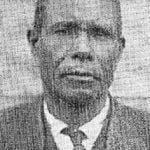In 1907, the last year under territorial government, arrangements were made for a patriotic celebration, in the form of a Chautauqua at the Academy. The following account of it is from the columns of the Garvin Graphic:
The Fourth of July meeting by the Freedmen at Oak Hill Academy, near Valliant, was a real patriotic Chautauqua, the first meeting of the kind ever held in this part of the Territory, and well worthy of more than a mere passing note. The preparations for the occasion, which included a comfortable seat for everyone, were fully completed before hand. The speakers’ stand and the Academy buildings were tastefully decorated with our beautiful national colors, one large flag suspended between two of them, being twelve feet long.
“The exercises included three series of addresses, interspersed with soul-stirring patriotic music by the Oak Hill Glee Club, and the speakers included several of the most eloquent orators in the south part of the territory. The occasion afforded ample opportunity for the free and full discussion of those questions, relating to the administration of our public affairs, that are now engaging the attention of the people; and this fact was greatly appreciated both by the speakers and the people.
“At the forenoon session James R. Crabtree presided with commendable grace and dignity. The Declaration of Independence was read in a very entertaining and impressive manner by Miss Malinda Hall, who has been an efficient helper in the work of the Academy, since its reopening two years ago. The principal address at this session was delivered by Rev. Wiley Homer, of Grant, a large, well built man with a strong voice, who for many years has been a capable and trusted leader among the Freedmen of this section. Others that participated were Johnson Shoals, of Valliant, who has been pursuing a course of study at the Iowa State Agricultural college, Ames, Iowa, and W. J. Wehunt, one of the prominent business men of Valliant.
“At the afternoon session Isaac Johnson, a natural born orator, presided and, both in his address and happy manner of introducing the speakers, enlivened the occasion with unexpected sallies of natural mother wit and eloquence. Rev. W. H. Carroll, of Garvin, one of the instructors of the Academy, discussed in an able manner a number of questions relating to the educational and Church work among the negroes; and he was followed by Prof. P. A. Parish, of Idabel, the well-known “Kansas negro,” but of full-blood African descent, who seemed at his best in the discussion of current and local public questions.
“Rev. Wiley Homer presided at the evening session and the address was delivered by Rev. Chas. C. Weith, of Ardmore. This address, delivered in the cool of the evening, marked the climax of interest. In an eloquent and forceful manner he recalled the events that led to the first declaration of independence, which was for the freedom of the soul by Luther in Germany in 1517; traced the growth of this sentiment in other countries until it found its expression in the Declaration of Independence for the citizen, by our forefathers in 1776; and pressed the urgent need of Godliness on the part of every American citizen, in order to have the highest type of patriot and to insure the permanency of our civil and religious liberty. This address was a rare treat for the people of this section.
Patriotic solos were rendered by Miss Bertha L. Ahrens, organist, Rev. W. H. Carroll, S. H. Buchanan, Mrs. J. A. Thomas and Miss Hall.
The barbecue was prepared during the night previous by Charles Bibbs.
Rev. R. E. Flickinger, the superintendent of the Academy, at the close of the day’s sessions, received hearty congratulations for the excellent character of the arrangements for the day and was encouraged to provide for similar patriotic celebrations in the future.”

